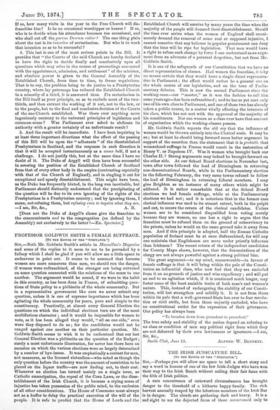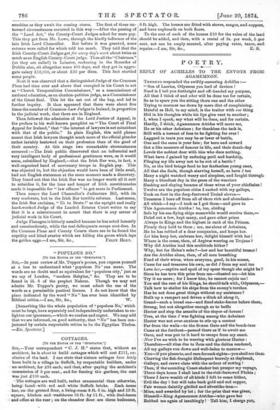THE IRISH JUDICATURE BILL.
[TO THE EDITOR OF THE "SPECTATOR"]
Sin,—Perhaps you will allow me space to tell a short story and say a word in honour of one of the few Irish Judges who have won their way to the Irish Bench without soiling their fair fame with the filth of Irish politics.
A rare concurrence of untoward circumstances has brought danger to the threshold of a hitherto happy family. The rich harvest annually reaped by the laborious members of the Irish Bar is in danger. The clouds are gathering dark and heavy. It is a sad sight to see the dejected faces of those accustomed only to
sunshine as they await the coming storm. The first of these un- toward circumstances occurred in this way :—After the passing of the "Land Act," the County-Court Judges asked for more pay. This they got from Mr. Lowe, through the kindly influence of the
late Irish Lord Chancellor. But before it was granted, some returns were called for which told too much. They told that the Irish County-Court Judges get for every day's work about twice as much as an English County-Court judge. Thus all the "Chairmen" (as they are called) in Leinster, reckoning in the Recorder of Dublin also, sit altogether some 400 days, and they get in aggre- gate salary £12,000, or about £30 per diem. This fact startled some people.
Next it was observed that a distinguished Judge of the Common Pleas had time over and above that occupied in his Court to act as "Church Temporalities Commissioner," as a commissioner of national education, as an election-petition judge, as a Commissioner of the Great Seal. This let the cat out of the bag, and led to further inquiry. It then appeared that there were about five times the number of Common-Law Judges in Ireland, in proportion to the judicial work, that there are in England.
Then followed the admission of the Lord Justice of Appeal, in the preface to his well-known pamphlet on "The Court of Final Appeal for Ireland," that "the interest of lawyers is not coincident with that of the public." In plain English, this mild phrase meant that Irish lawyers thought much more of the official plunder rather lavishly bestowed on their profession than of the good of their country. At this stage two remarkable circumstances occurred :—The Irish public discovered that an influential and very intelligent body of professional gentlemen were, as it would seem, subaidised by England,—that the Irish Bar was, in fact, a well-organised band of mercenary troops in English pay. This was objected to, but the objection would have been of little avail, had not English statesmen at the same moment made a discovery. They found out that the Irish Bar was no longer worth all it cost to subsidise it, for the tone and temper of Irish constituencies made it impossible for "law officers" to get seats in Parliament.
Then comes the Lord Chancellor's Judicature Bill, with its very moderate, but to the Irish Bar terrible reforms. Last scene, the Irish Bar exclaims, "Et tu Brute !" as the upright and really hard-worked Judge of the Landed Estates Court writes to say that it is a misstatement to assert that there is any arrear of judicial work in his Court.
Judge Flanagan is bitterly assailed because be has acted honestly and conscientiously, while the real delinquents escape scot-free. In the Common Pleas and County Courts there are to be found the cupidity and blind avarice which are killing the goose which lays
the golden eggs.—I am, Sir, &c., FELIX HOLT.



































 Previous page
Previous page